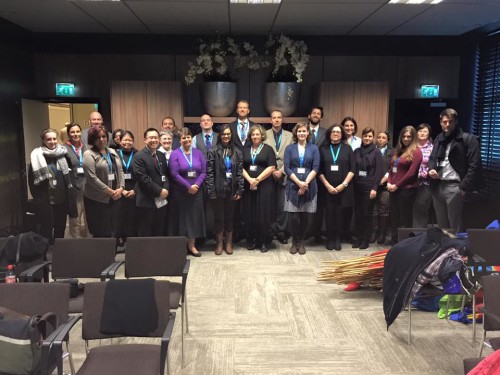The Hague International Model United Nations (THIMUN) is one of the largest and most prestigious Model UN conferences with over 3,000 delegates participating every year. After multiple Director Institutes at THIMUN Qatar, Best Delegate ran the Director Institute for faculty advisors at THIMUN Hague for the first time this past January. Level 1 taught beginner Directors the basic concepts of Model UN such as resolution-writing and THIMUN rules of procedure and Level 2 taught advanced Directors how to empower student leaders to run their clubs, train their teams, and host their own conferences.

THIMUN Hague Director Institute. The Level 1 participants are pictured here.
In the process of teaching the Director Institute, I learned a few lessons as well:
1. Teaching Load is the biggest pain point: Directors mentioned that their biggest challenge was that there was no teaching load relief despite putting in so many extra days in Model UN. Teaching load relief was considered much more desirable than a MUN Director stipend, which some well-funded schools give out. Short of integrating Model UN into the classroom, this will continually be a structural issue that needs to be tackled. In the meantime, students and parents should definitely thank their Directors for putting in so many extra unpaid hours in supervising the MUN club after school and chaperoning them at MUN conferences!
2. Student Officer structures can be modified: Many Directors realised that they could do so much more in empowering their student officers — the THIMUN culture proudly upholds that MUN should be a student-led activity — and feel a lot less overwhelmed if they modified their Student Officer structures. Most Directors inherited the Student Officer structure, but many of these are no longer built for the expanded club membership and club activities if the club has grown beyond 20 members. Related to this point, clubs that host their own conferences — even if it’s just an internal mock session — should have two separate Student Officer structures for the club and the conference. This division of responsibility will make everyone’s lives more clear and sustainable.
3. Knowledge needs to be institutionalised: One of the biggest issues for schools worldwide but is particularly prevalent at international schools is high teacher turnover. As I saw at THIMUN Hague, this even affects schools that run some of the most established and prestigious THIMUN-affiliated conferences. Although students run the MUN club, they should try to institutionalise their knowledge so that the club does not face a knowledge gap when both new students and a new Director take over. Directors cited in particular that knowing typical deliverables and timelines for various projects such as taking a team to an international trip or running a conference should be written down in a formal club document. This would make it much easier for them to step into the role and help guide the new Student Officers in meeting their deliverables on time.
**
MUN Directors (faculty advisors and teachers) may be interested in attending the Model United Nations Advisors Institute held at Georgetown University in late June and at Harvard University in early August. More information can be found here: MUN Advisors Institute.

